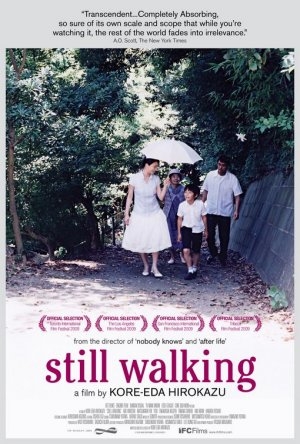 STILL WALKING (2008, directed by Hirokazu Koreeda, 114 minutes, Japan)
STILL WALKING (2008, directed by Hirokazu Koreeda, 114 minutes, Japan)
BY DAN BUSKIRK FILM CRITIC
Holed up at the end of the night in his parents guestroom, forty-ish Ryota (Hiroshi Abe) tries unsuccessfully to wheedle a secret out of his wife Yukari (Yui Natsukawa). Giving up he tells her, “Women are scary”. “”People are scary, she corrects, “All people.” The most seemingly benign folks can be scary, especially when you’re related to them. In what appears to be his most conventional film yet Japanese minimalist Hirokazu Koreeda (director of Afterlife and Nobody Knows), the lionized modern master bring his acclaimed subtlety to an Ozu-like domestic drama, Still Walking. Still taking his daily strolls is Ryota’s father Kyohei (Yoshio Harada), a retired small town general practitioner who holds his family in barely concealed contempt. Ryota and his sister Chinami (the singularly named You) return to the family home with their spouses and children to visit their housewife mother Toshiko (the excellent Kirin Kiki) and taciturn father on the fifteenth anniversary of their brother’s accidental death, to brave the passive-aggressive (and sometimes, just aggressive) slings and arrows that only family can deliver.
Koeeda’s style is so restrained and observational that the heart of the drama starts off nearly unnoticed. The dead son Junpei is mentioned only in passing but as the details pile up we see that his death is at the center of this family’s pain. After a while the careful construction of Korreda’s script becomes clear and the story begins to resemble classic 20th century theater, like a low-key version of “A Long Day’s Journey Into Night”. Koreeda recognizes how the presence of different family members effects what subjects are discussed; some members allow the characters to hide their wounds, others (especially the family patriarch) draw their knives and dig in.
When the sister’s family heads home after dinner it is just Ryota and his wife and son left to face the aging mother and father, and as the evening arrives most of the niceties are over. The family’s resentments are dragged out and poked with sharp sticks; infidelities, Ryota’s refusal to follow his father into the medical profession and the meaningless of Junpei’s death force everyone to admit or reveal their flaws and failures. Koreeda is so astute at subtly inferring the roots of this families pain that it is a bit disappointing when he leans on some heavy symbolism and melodrama involving butterflies and youngster’s prayers to God. These missteps are fleeting though, and Koreeda’s observations on inter-generational friction and the way parents can spend a lifetime torturing their offspring makes Still Walking an unusually perceptive study that transcends the distance between cultures. The arrival of autumn means holiday dinners are almost upon us: Still Walking’s unblinking insights might help us field any unwelcome comments that will be ungracefully lobbed across the family table.
